Related Research Articles
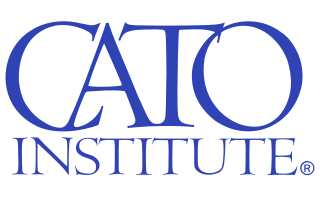
The Cato Institute is an American libertarian think tank headquartered in Washington, D.C. It was founded in 1977 by Ed Crane, Murray Rothbard, and Charles Koch, chairman of the board and chief executive officer of Koch Industries. Cato was established to have a focus on public advocacy, media exposure and societal influence. According to the 2020 Global Go To Think Tank Index Report, Cato is number 27 in the "Top Think Tanks Worldwide" and number 13 in the "Top Think Tanks in the United States".

Patrick J. Michaels was an American agricultural climatologist. Michaels was a senior fellow in environmental studies at the Cato Institute until 2019. Until 2007, he was research professor of environmental sciences at the University of Virginia, where he had worked from 1980.
The Institute of Economic Affairs (IEA) is a right-wing think tank and UK registered charity associated with the New Right. The IEA describes itself as an "educational research institute". It says that it seeks to "further the dissemination of free-market thinking", and that it does so by "analysing and expounding the role of markets in solving economic and social problems." The IEA subscribes to a neoliberal worldview and advocates positions based on this ideology. It published climate change denial material between 1994 and 2007, and has advocated total privatisation, in effect abolition, of the National Health Service (NHS), in favour of a healthcare system the IEA says is similar to Switzerland, Belgium, the Netherlands, Germany and Israel. The IEA has received more than £70,000 from the tobacco industry, and IEA officers have been recorded offering "cash for access". The IEA is headquartered in Westminster, London, England.

The Fraser Institute is a conservative-libertarian Canadian public policy think tank and registered charity. The institute is headquartered in Vancouver, with additional offices in Calgary, Toronto, and Montreal, and ties to a global network of 80 think tanks through the Economic Freedom Network. It is a member of the Atlas Network of libertarian policy lobbyists.
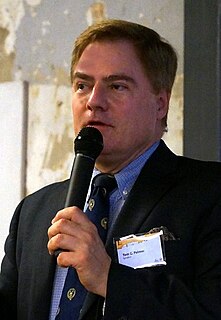
Tom Gordon Palmer is an American libertarian author and theorist, a Senior Fellow at the Cato Institute and Vice President for International Programs at the Atlas Network.

Atlas Network, formerly known as the Atlas Economic Research Foundation, is a non-governmental 501(c)(3) organization based in the United States that provides training, networking and grants for libertarian, free-market, and conservative groups around the world. It partners with about 500 organizations in nearly 100 countries.
The Social Affairs Unit is a right-leaning think tank in the United Kingdom. Founded in 1980 as an offshoot of the Institute of Economic Affairs, it publishes books on a variety of social issues. Its website notes that "many SAU supporters are inclined to believe that the generation which fought the Second World War were rather too keen on social engineering over the goals of personal responsibility".
Steven J. Milloy is a lawyer, lobbyist, author and Fox News commentator. His close financial and organizational ties to tobacco and oil companies have been the subject of criticism, as Milloy has consistently disputed the scientific consensus on climate change and the health risks of second-hand smoke.
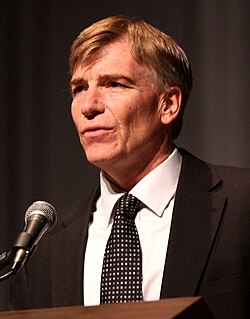
Ivan Eland is an American defense analyst and writer. He is a Senior Fellow and Director of the Center on Peace and Liberty at the Independent Institute. Eland's writings generally propose libertarian and non-interventionist policies. Books that he has authored include Recarving Rushmore.

The Heartland Institute is an American conservative and libertarian public policy think tank known for its rejection of both the scientific consensus on climate change and the negative health impacts of smoking.
Patrick Diamond worked as a policy advisor under the Labour Party government of the United Kingdom in a role covering policy and strategy.
Gio Batta Gori is an epidemiologist and fellow with the Health Policy Center in Bethesda, Maryland which he established in 1997 and where he specializes in risk assessment and scientific research. He was deputy director of the United States' National Cancer Institute's Division of Cancer Cause and Prevention, where he directed the Smoking and Health Program and the Diet and Cancer Program.

The Montreal Economic Institute (MEI) is a non-profit research organization based in Montreal, Quebec, Canada. It aims at promoting economic liberalism through economic education of the general public and what it regards as efficient public policies in Quebec and Canada through studies and conferences. Its research areas include different topics such as health care, education, taxation, labour, agriculture and the environment. Its studies are often mentioned in the media.
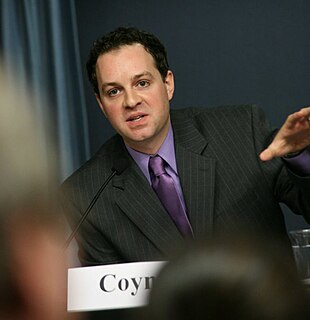
Christopher J. Coyne is the F.A. Harper Professor of Economics at George Mason University and the associate director of the F. A. Hayek Program for Advanced Study in Philosophy, Politics, and Economics at the Mercatus Center.
Patrick Basham is a former adjunct scholar and senior fellow of the Cato Institute, and the founding Director of the Democracy Institute. Basham was previously the founding director of the Social Affairs Centre at the Canadian Fraser Institute. He has published a number of books and contributed articles to a range of major US newspapers.
John C. Luik was a senior fellow of the Democracy Institute. A Rhodes Scholar attached to Hertford College at the University of Oxford, he was a Senior Associate of the Niagara Institute with responsibility for its work in public policy and its Values and Organizational Development programmes." From 1977 to 1990 he taught philosophy and ethics at two Canadian universities, but was dismissed from each for misrepresenting his academic credentials. He acted on behalf of the tobacco industry amongst others and was prominent in criticising the evidence related to the claimed links between passive smoking and cancer.
The political activities of the Koch brothers include the financial and political influence of Charles G. and David H. Koch (1940–2019) on United States politics. This influence is seen both directly and indirectly via various political and public policy organizations that were supported by the Koch brothers.
MPOWER is a policy package intended to assist in the country-level implementation of effective interventions to reduce the demand for tobacco, as ratified by the World Health Organization (WHO) Framework Convention on Tobacco Control. The six evidence-based components of MPOWER are:

The Manhattan Institute for Policy Research is a conservative American think tank focused on domestic policy and urban affairs, established in Manhattan in 1978 by Antony Fisher and William J. Casey. The institute has produced books, articles, interviews, speeches, op-eds, and the quarterly publication City Journal.
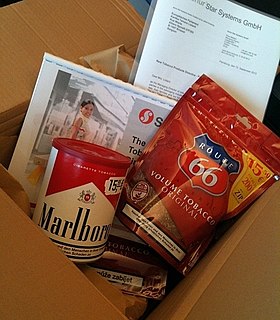
The tobacco industry playbook, tobacco strategy or simply disinformation playbook describes a strategy devised by the tobacco industry in the 1950s to protect revenues in the face of mounting evidence of links between tobacco smoke and serious illnesses, primarily cancer. Much of the playbook is known from industry documents made public by whistleblowers or as a result of the Tobacco Master Settlement Agreement. These documents are now curated by the UCSF Truth Tobacco Industry Documents project and are a primary source for much commentary on both the tobacco playbook and its similarities to the tactics used by other industries, notably the fossil fuel industry. It is possible that the playbook may even have originated with the oil industry.
References
- 1 2 Democracy Institute, About Us Archived 2010-11-26 at the Wayback Machine , accessed 8 August 2010
- ↑ "Democracy Institute - TobaccoTactics". tobaccotactics.org. Retrieved 2020-11-08.
- 1 2 Cato Institute, Patrick Basham, accessed 8 August 2010
- ↑ "Democracy Institute, 10 June 2015". Archived from the original on 26 November 2010. Retrieved 8 August 2010.
- ↑ John Luik (2006), "A Picture of Health? Why Graphic Warnings Don't Work Archived 2014-04-03 at the Wayback Machine ", Democracy Institute